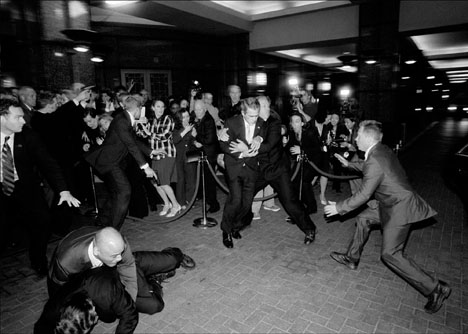Controversial ‘Death of a President’ film wins in Toronto, sells for $1 million

This still from video, provided and digitally manipulated by the British television company Channel 4, is a scene from the “Death of a President,” In the fictional film, shot in the style of a retrospective documentary, President Bush is assassinated by AP Photo/More4-Channel 4
Sep 25, 2006
Last updated on May 12, 2016 at 04:47 a.m.
At this year’s Toronto International Film Festival, controversy once again erupted over President George W. Bush’s appearance on the big screen – and this time Michael Moore’s name can’t be found anywhere in the credits. In fact, while Moore’s 2004 film “Fahrenheit 9/11” gave the President a starring role in theaters all over the world, British director Gabriel Range’s new film, “Death of a President,” uses Bush’s likeness to depict a wholly fictitious event of a different nature: his assassination.
Though the movie immediately sparked a fire storm of controversy both domestically and abroad, critics in Toronto generally seemed to enjoy the film. At the close of the festival, the movie won the Prize of the International Critics from a prestigious international jury, who cited in a press release “the audacity with which it distorts reality, to reveal a larger truth.”
According to material released by Range’s production company, Borough Films, the movie is set in the near future, a few years after Bush is gunned down by an unknown sniper in Chicago. Range’s film mixes actual footage with digital effects and staged scenes that depict Bush’s death by gunshot wound.
In spite of the coverage that the film has received, the White House declined to comment, stating that the movie does not merit a response.
Get The Daily Illini in your inbox!
“I think (the premise) is pretty inappropriate no matter who the national leader is,” said Justin Randall, a junior in LAS and president of the University College Republicans.
While many agree that the film’s subject matter is extremely provocative, not all critics gave the movie a warm reception.
“Having seen it, I can say that ‘Death of a President’ keeps its tone civil and its pace measured, to a fault,” said Chicago Tribune film critic Michael Phillips in a review. “It’s a bit of a grind. While Range certainly has a political agenda, he’s going for a brand of hushed realism bordering on the mundane. It’s best considered as a well-sustained technical experiment in a certain style.”
Following the film’s successful reception at the Toronto Film Festival, director Range, who also created and produced the movie, sold distribution rights to Newmarket Films for a reported $1 million. The company, which also handled Mel Gibson’s controversial “The Passion of the Christ,” could not be reached for comment, but reports indicate that a U.S. release is planned within the next few months.
Meanwhile, media interest in the film continues to be substantial.
“We don’t even work on D.O.A.P. anymore, it’s (in the distributor’s) hands now,” said Seth Hyman, a representative of The Dart Group, a New York-based firm that handled publicity for Range’s film. “But we still get a lot of calls about the movie.”
Range himself, well aware that his movie would make a big splash, told Toronto premiere audiences that the film was not trying to be sensational, according to the AP.
“It is using the lens of the future to look at the present,” he said.





